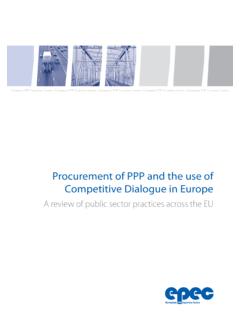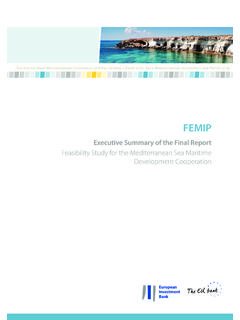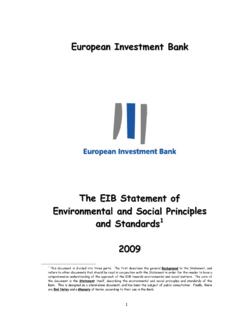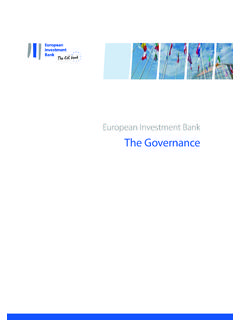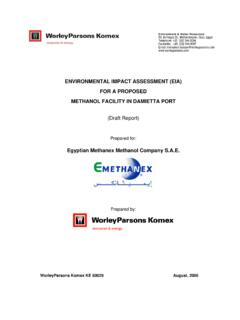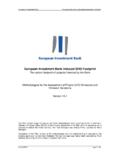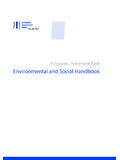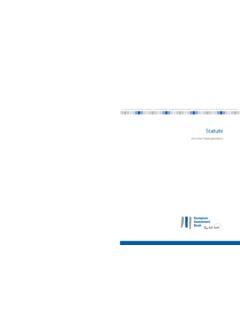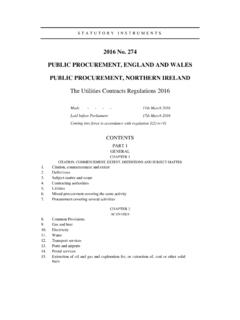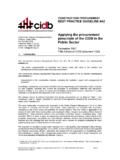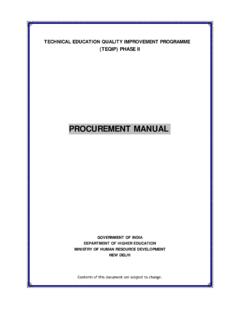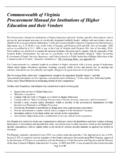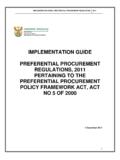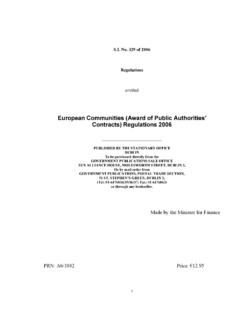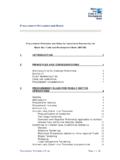Transcription of European Investment Bank Guide to Procurement
1 European Investment bank Guide to Procurement Guide TO Procurement for projects financed by the EIB Updated version of June 2011 European Investment bank Guide to Procurement June 2011 page 2 / 36 TABLE OF CONTENTS Introduction 1. General The bank s Policy .. 4 Eligibility of Contractors and Suppliers of Goods and Services .. 4 bank and Promoters: Respective Roles .. 5 Ethical Conduct .. 5 Conflict of 6 Transparency of bank Activities .. 6 Disclosure of Information .. 6 Complaints against the bank .. 6 Environmental and Social 7 2. Operations within the European Union ..7 Operations to which EU Directives 7 Operations to which EU Directives do not apply .. 8 3. Operations outside the European 9 Eligibility of Providers of Works, Goods and Services.
2 9 Financing from Own Resources .. 9 Financing under Resources from Third Parties .. 9 Co-financing from Own Resources .. 9 Description of Procurement Procedures .. 10 General .. 10 International Procurement Procedures .. 10 National Procurement Procedures .. 11 Selection of Procurement Procedures .. 11 Operations in the Public Sector .. 11 Operations in the Private Sector .. 13 Concession 14 Specific 15 Specific Case of Joint Co-financing .. 16 bank Review of Procurement Decisions (for both public and private operations).. 16 Prohibited Conduct - Covenant of Integrity .. 17 International Procurement Procedures .. 17 General Aspects .. 17 Publication of the Procurement 17 Pre-qualification in Restricted Procedures .. 18 Tender Documents.
3 18 Language .. 19 Technical Specifications .. 19 Tender Prices for Goods, Works and Services .. 19 Currency .. 20 Local Preference for 20 Tender Evaluation Criteria .. 21 Opening of Tenders .. 21 Evaluation of Tenders .. 21 Award and Signature of the Contract .. 21 Award Notice ..22 4. Consultancy Services financed by the bank ..23 Projects Located Within the European 23 Projects Located Outside the European Union .. 23 Description of Procedures .. 23 Selection of Procedures .. 24 Evaluation of Consultants 24 Management of the 25 Annex 1 Specific Procurement Terms and Practices 26 Annex 2 Review by the bank of Procurement Decisions 28 Annex 3 Covenant of Integrity 30 Annex 4 Eligibility for Operations Financed under Resources from External Mandates 32 Annex 5 Definition of Public Operations Outside the European Union 33 Annex 6 Standard Form of the Procurement Notice 36 European Investment bank Guide to Procurement June 2011 page 3 / 36 INTRODUCTION The purpose of this Guide to Procurement is to inform the promoters of a project whose contracts are financed in whole or in part by the European Investment bank ( the bank )
4 - or are financed under loans guaranteed by the bank - of the arrangements to be made for procuring works, goods and services required for the project. This Guide applies specifically to those components of a project identified for bank s financing. However, in order to ensure the overall feasibility of the project, the bank requires that Procurement of the other project components does not compromise the project s technical, economic and financial viability. The terms open, restricted and negotiated procedures, and competitive dialogue are used in this Guide with the meaning defined by European Union (EU) Directives on Procurement (see definitions set out in Annex 1). This Guide will be updated as deemed necessary by the bank .
5 Version dated June 2011. European Investment bank Guide to Procurement June 2011 page 4 / 36 1. GENERAL ASPECTS The bank s Policy The main elements of the bank s policy on Procurement are: The bank will ensure that its funds are employed as rationally as possible. This requires that the works, goods and services procured under its financing are of appropriate quality, and acquired at economic prices and in a timely manner. This is generally best achieved through open international competition. It is consistent with the bank s statute and accords with the interests of promoters. In projects located within the European Union (EU), and in those Candidate Countries (with which negotiations are already in progress for their accession to the EU) and Potential Candidate Countries that have already incorporated the relevant EU legislation, the bank requires that the applicable EU Law on public Procurement , in particular the relevant EU Procurement Directives concerning competitive tendering on the basis of fair and non-discriminatory terms, be complied with, particularly as concerns open or restricted procedures with publication in the Official Journal of the European Union (OJEU).
6 In all other countries outside the Union, the bank requires that the main mechanisms of the EU Directives on Procurement be followed, with the necessary procedural adaptations. These mechanisms may be summarised as open international competition, non-discrimination of tenderers, fairness and transparency of the process, and selection of the economically most advantageous offer. Thus open or restricted procedures with publication in the OJEU is the bank s preferred method. The actual choice of Procurement procedures ultimately has to take into account a range of considerations, relating in particular to the commercial nature and interests of the promoter; the sector involved; the nature of the works, goods and services to be procured; the technology to be used; the size of individual components; the timetable for implementation; the number of firms potentially able to undertake the work or provide the supplies or services; the competitiveness of the market; etc.
7 In the case where open or restricted procedures are not followed, promoters must, to the satisfaction of the bank , justify their decision to use a different procedure; they must prove that the prices for the works, goods or services are commensurate with those obtained for equivalent investments in the light of market conditions and that, at the very least, any differences in cost can be explained by specific verifiable factors. Eligibility of Contractors and Suppliers of Goods and Services In the usual case of projects (both inside and outside the Union) financed by the bank s own resources (funds raised mainly through the bank s borrowings on capital markets), firms originating from all countries of the world are eligible to tender for works, goods and services contracts.
8 In some specific cases of projects outside the Union, the bank s financing comes from third parties, and the origin of firms eligible to participate in the Procurement may then be partly restricted. Details of such restrictions are provided in section In addition, individuals or firms may not be eligible to tender in application of section on Ethical Conduct. European Investment bank Guide to Procurement June 2011 page 5 / 36 bank and Promoters: Respective Roles Promoters are fully responsible for implementing projects financed by the bank , in particular for all aspects of the Procurement process, from drafting tender documents and awarding contracts through to implementing contracts. The involvement of the bank is confined solely to verifying whether or not the conditions attached to its financing are met.
9 The bank may advise or assist promoters in the Procurement process, but is not a party to the resulting contracts. The bank has the right and obligation to ensure that, in the case of projects inside the Union, EU provisions in this field or, in the case of projects outside the Union, the relevant criteria with regard to the proper management of its financing are respected, and that the Procurement process is fair and transparent and the tender selected is economically the most advantageous. The rights and obligations of the promoter vis- -vis the tenderers for works, goods or services to be furnished for a project are governed by the local legislation and tender documents published by the promoter, and not by this Guide .
10 In addition, the EIB requires promoters to ensure that review procedures for effective remedies are available to any party having or having had an interest in obtaining a particular contract and who has been or risks being harmed by an alleged infringement. This should be distinguished from the bank s own review of Procurement decisions for projects located outside the European Union, which is summarised in section and in Annex 2. Ethical Conduct It is the bank s policy to require that promoters, as well as tenderers, contractors, suppliers and consultants under bank -financed contracts, observe the highest standard of ethics during the Procurement and execution of such contracts. The bank reserves the right to take all appropriate action in order to enforce this policy.
